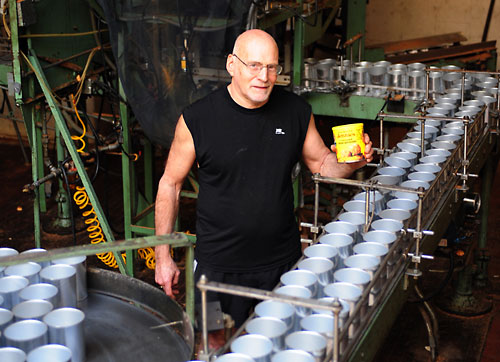There’s no rest for the Macaroon King of Williamsburg.
The end of the Passover holiday means that Arnold Badner’s work is done for another season. But just because the Jennies Macaroon factory on South Fifth Street finally went silent last Friday doesn’t mean Badner isn’t busy.
Plotting the future of the macaroon is a 24-7 job.
In the last three years, Badner, the Jennies president, has introduced a low-carb option and individually wrapped two-ounce impulse items.
But that’s small potatoes compared to his favorite: his Jennies Omega-3 energy bars, which is basically his traditional macaroon pumped up with flax, sunflower and pumpkin seeds and squeezed into a candy bar shape.
“This was my life’s goal: to get away from Passover,” Badner says, matter-of-factly.
The Passover macaroon-making season, which starts on Nov. 1, once made for 80 percent of Badner’s annual revenues, but this year, he projects it at only 30 percent.
That means the business now works year-round to supply to the health foods industry.
As he led The Brooklyn Paper through his 100-year-old Williamsburg factory, Badner, dressed in black running shorts and a black muscle T, talked about the 14.4 million kosher macaroons he produced in the last five months. The factory was silent, but one could still smell the coconut oils and see the empty cans, waiting for their lode. On a typical 12-hour day, the 10-man team would mix, bake, and package 10,000 cans on the original early-19th century pneumatic machines.
But macaroons have a manifest destiny: energy bars.
“His Omega-3 bar is a unique spin, and the customers like it,” said Rae Miller, the purchasing director at Healthy Directions, an Internet-based health foods supplier that has purchased Badner’s bars to market under her company’s label.
Of course, macaroons remain a mainstay. While other manufacturers include preservatives, sweeteners, or other additives, Badner makes a point to use only egg whites, honey, and coconuts. The eggs and honey come from local suppliers, and the coconuts are from the Philippines.
As a result, Badner’s macaroons are free of gluten, dairy and sulfites — and some nutritionists claim that coconuts’ luric acid can ease digestive and autoimmune diseases.
These benefits encourage Badner, a former triathlete, marathon runner, and avid cyclist, to always be thinking about the next project.
What started in 1969 has now become a multi-million-dollar success story — and business has only slowed once (when the Centers for Disease Control determined in the 1990s that coconuts’ saturated fats were bad).
Eventually, nutritionists fell back in love with coconuts because of their nutritional benefits — no transfats or cholesterol! All natural! Badner was back in business.
While he won’t reveal annual revenues, he claimed that sales of his $3.49 tins doubled this year. Selling his products online opened up new profit margins, and Badner is quickly revamping his Web site, www.macaroonking.com.
“The whole objective is to increase the number of products on the shelf,” Badner said. “If you have one, you should have three.”
Indeed, in the last five years, he’s made it into every Whole Foods nationwide, and he is marketing the product in Canada with a dual-language label.
“My next project,” he said one recent Friday afternoon, “is to put that [bar] into a macaroon. We’re going backwards, from the macaroon to the bar back to the macaroon.”
Within minutes, Badner was on the phone with his buyers nationwide. He pitched the idea — bite-sized Omega-3 energy bars, packaged in a can — and then cracked a smile.
The buyers loved the idea, and he will present the concept to Whole Foods distributors in June.
Before the big macaroon-baking rush begins, of course.























